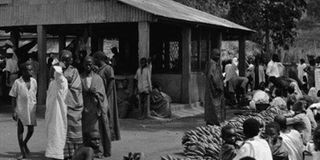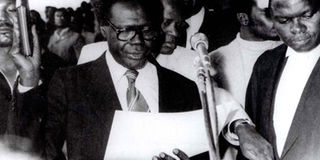Obote attempts to rescue collapsing economy

Economy. Ugandans at a native market. The departure of Asians, who controlled most businesses left a scar on the economy and Ugandans would start feeling the pinch soon after 1972. FILE PHOTOS
What you need to know:
- Part II. Upon entering State House in 1980, president Milton Obote hired the best economists from the Commonwealth Secretariat to study the situation in Uganda.
- The team started work in early February 1981 and submitted its report in May 1981.
In 1980, Uganda was the world’s poorest economy. The national inflation was at 107.3 per cent.
Between 1970 and 1980 the average growth for the low-income developing countries was 4.5 per cent per annum. Uganda’s average growth rate over the same period was -1.6 per cent per annum.
Uganda’s monetary sector suffered the greatest with a decline of some 25 per cent between 1970 and 1980, the World Bank report for 1981 recorded.
So when the Uganda Peoples Congress (UPC) government led by Milton Obote took power in December 1980, the economy was in shambles.
Upon entering State House, president Obote on the recommendation of the International Monetary Fund (IMF) hired the best economists from the Commonwealth Secretariat to come and study the situation in Uganda and provide recommendations.
The team was led by Prof Dudlery Seers. Current Bank of Uganda Governor Emmanuel Tumusiime-Mutebile was one of the few Ugandans who were included on the team. The team started work in early February 1981 and submitted its report in May 1981.
The report recommended terms for quick “recovery and rehabilitation” of Uganda’s economy. The team also recommended that work should be executed within two years in order to avoid total economic collapse.
Implementing IMF recommendations
Effective July 1, 1981, the UPC government started implementing the recommended policies.
While addressing the National Council of the UPC party in Kampala on Friday, August 21, 1981, president Obote told members that his government had increased the minimum wage by Shs550 from Shs240 effective July 1, 1981.
The president also announced that there would be salary increment for all categories of public servants. In the third quarter of 1981, Obote established a salary review commission to study and make recommendations about salary increment for civil servants.
The Ominde Salary Review Commission’s terms of reference included: to identify anomalies that had eroded the morale and productivity of the civil servants during the Amin regime and to make proposals to be adopted in order to improve on government workers’ productivity.
Effective June 1, 1982, the UPC government announced a 20 per cent wage increment to all government workers. While that was provisional as the government was still studying the Ominde Salary Review Commission, the government also announced Pay-As-You-Earn tax exemption for all civil servants.
And in July 1983, the government increased wages of civil servants by 50 per cent. But this did not yield anything positive for the economy. Because of the inflation, between 1981 and 1984, the UPC government increased wages of the civil servant thrice, but the situation kept on worsening.
As the UPC government raised salaries, its budget was in deficit of Shs8.2 million.

Elected. Twelve Ugandans were elected to the Legislative Council, 10 of them directly. The 10 included Apollo Milton Obote representing Lango District.
Floating the currency
One of the recommendations by the IMF was to float the Uganda Shilling. The policy of massive float of the shilling effective June 1, 1981, was conducted to actualise the real value of the shilling. The float of the shilling was accompanied by a package of measures for its implementation such as window I and window II.
The policy was the brainchild of IMF and World Bank. They recommended the idea on grounds that the Uganda Shilling had been overvalued during Amin’s regime from 1971 to 1979. Massive devaluation was needed in order to find the real value.
As soon as the negative effects of devaluation, which included rising cost of imports and domestic inflation, kicked in and the policy backfired, UPC disowned the float policy and said it a condition for the IMF to come to Uganda’s aid.
Kakobogo wage increment
In a desperate attempt to appease the masses, especially government employees, Obote’s government went for a massive wage increment which UPC diehards called “Kakobogo”, meaning too good.
On July 1, 1984, the government announced a 450 per cent wage increment for all government workers.
This was done to boost morale and productivity and deter corruption, among other vices – but to no avail. This was so partly because inflation was always rising and the government could not do much to solve the situation.
The IMF opposed Kakobogo policy and argued UPC government to hold onto a tight budgetary control and also cautioned the government not to increase recurrent expenditure as the 1984/85 deficit by raising wages once again.
Prof Ochieng reviews economy
In 1991, Erisa Olweny Ochieng, then Associate Professor from the department of Economics at Makerere University, while analysing Uganda’s economy in the book Uganda 1986-1991: An Illustrated Review wrote that: “In 1981, the government instituted economic stabilisation with the guidance and assistance of the International Monetary Fund (IMF). The major objectives of the programmes were to halt the deterioration of the economy, revive production, restore confidence in the shilling, eliminate price distortions, improve fiscal and monetary discipline and lay a firm foundation for sustained recovery.”
“Specific measures adopted by the government then included: realignment of external value of the shilling which resulted in depreciation of the external value of the shilling by 41 times in only three years.
“In summary, we can generally say that the programmes attained short term success in the reviving of the economy i.e. in moderating the inflation, in reducing the parallel market activities, smuggling and improving the balance of payment position.”
But Prof Ochieng noted that the positive trends were not sustainable beyond the third quarter of 1984, mainly because the programme was abandoned after the June 1984 foreign finance had dried up and there was a civil war.
The declining economic trends which had begun in 1984 continued at an accelerated speed and eroded most of the positive gains which had been achieved during the period of 1982 to 1983.
History
On Friday, August 21, 1981, president Obote told members that his government had increased the minimum wage by Shs550 from Shs240 effective July 1, 1981.
The president announced that there would be salary increment for all categories of public servants.




